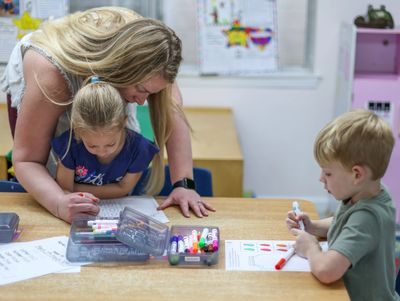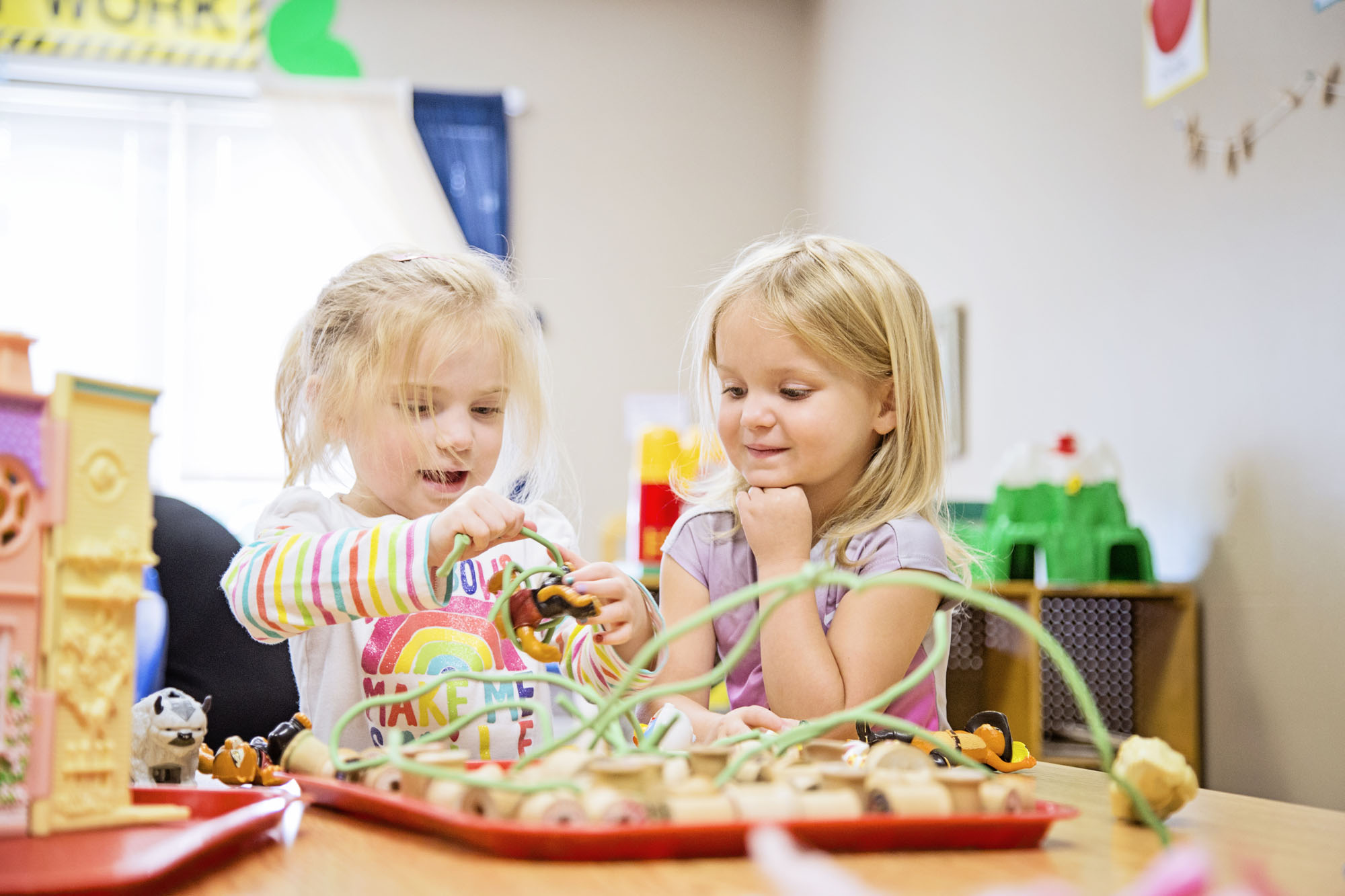How Private School programs promote creativity through arts and crafts
Wiki Article
The Value of Interactive Tasks in Grade School Education
Interactive activities play a crucial duty in elementary school education and learning. They involve trainees and improve learning results. Via team projects and hands-on experiments, trainees experience the material in a sensible way. This method deals with diverse knowing designs and promotes necessary skills. Nevertheless, the advantages extend past academics. Discovering the deeper influence of these tasks exposes their relevance fit young learners' futures. What changes happen when students proactively participate?Enhancing Interaction Via Interactive Discovering
Typical mentor techniques have their values, interactive knowing substantially enhances student interaction in grade school education and learning. This method encourages active participation, permitting pupils to submerse themselves in the discovering process. By making use of group tasks, hands-on experiments, and technology-driven sources, instructors create a setting where students really feel much more linked to the product.Interactive learning helps with cooperation among peers, fostering communication abilities and teamwork. It likewise deals with varied knowing styles, ensuring that aesthetic, auditory, and kinesthetic students can all flourish. In addition, students are most likely to preserve info when they proactively get involved, instead of passively obtaining expertise.
This dynamic method not only makes discovering enjoyable yet also imparts a sense of possession in trainees regarding their academic journey. As they engage with the material, their interest and inspiration to find out increase, laying a strong foundation for future scholastic success.
Creating Crucial Believing Skills
Interactive knowing not just enhances involvement but also offers as a driver for developing important assuming skills in quality institution trainees. Via activities such as problem-based learning, arguments, and hands-on experiments, pupils are urged to analyze details, evaluate different perspectives, and create reasoned final thoughts. These interactive experiences need pupils to wonder about presumptions, leading them to believe even more deeply about various subjects.
Moreover, interactive tasks usually existing real-world situations that test pupils to apply their understanding artistically. By navigating with these obstacles, they learn to identify relevant info and make informed choices. This process fosters not only private essential reasoning but likewise motivates students to express their assumed processes, improving their capability to communicate properly. As an outcome, interactive learning settings cultivate a generation of critical thinkers who are much better prepared to deal with intricate problems in their future scholastic and expert undertakings.
Cultivating Collaboration Among Peers
Cultivating cooperation among peers is crucial in grade school education and learning, as it enhances team effort and communication skills. Participating in group activities assists trainees build depend on and regard for each other, laying the foundation for efficient partnership. Additionally, analytic together enables pupils to learn from each various other and develop a cumulative approach to difficulties.Team Effort and Communication Abilities
Reliable synergy and interaction skills are essential parts of a successful grade institution education. Involving in interactive tasks urges trainees to collaborate, share concepts, and address problems together. Such experiences promote the advancement of critical communication capabilities, allowing children to express their thoughts clearly and pay attention actively to others. With teamwork, trainees learn to appreciate diverse perspectives, promoting a feeling of neighborhood and shared responsibility. Structured group jobs, whether in academics or imaginative jobs, improve peer interactions, educating children how to discuss roles and resolve problems. As a result, these skills not only contribute to a favorable class atmosphere but likewise prepare trainees for future joint endeavors in higher education and the workplace. Generally, team effort and interaction are fundamental to holistic growth in quality institution.Building Trust and Respect
Building depend on and regard among peers functions as a keystone for effective collaboration in quality college atmospheres. When pupils feel valued and valued by their schoolmates, they are more probable to involve actively in group tasks. Interactive tasks, such as team tasks and cooperative games, provide possibilities for trainees to pick up from each other, cultivating a feeling of neighborhood. This environment encourages open interaction, enabling students to share their ideas and viewpoints without concern of judgment. As depend on constructs, pupils become a lot more going to share duties and support each various other's discovering. Inevitably, cultivating an environment of trust fund and regard improves not just scholastic results yet additionally social growth, furnishing students with necessary interpersonal skills for their future undertakings.Problem-Solving With each other
Collective analytical engages trainees in crucial thinking and team effort, vital abilities for their personal and scholastic growth. When pupils interact to tackle challenges, they find out to interact properly, regard diverse perspectives, and utilize each various other's strengths. This process boosts their ability to examine problems from various angles and create imaginative options. Team activities, such as scientific research experiments or mathematics challenges, advertise energetic involvement and cultivate a sense of community. As students team up, they additionally build social skills, learning to jeopardize and discuss, which are crucial for future communications. Ultimately, analytic together cultivates a supportive discovering atmosphere, encouraging students to take possession of their education while preparing them for collaborative endeavors past the class.Urging Creative Thinking and Advancement
Motivating creativity and innovation in elementary school education can be significantly boosted with hands-on understanding experiences. These tasks enable students to engage straight with concepts and materials, fostering imaginative thinking. Furthermore, collaborative group projects can stimulate varied ideas and options, better supporting an imaginative setting.Hands-On Understanding Experiences
A multitude of hands-on understanding experiences substantially boosts creative thinking and technology in grade college education and learning. Involving students in useful activities permits them to use academic expertise in real-world contexts, promoting much deeper understanding. By manipulating products and devices, kids develop critical analytic skills and find out to think outside the box. These experiences influence inquisitiveness and motivate pupils to explore their interests further. Additionally, hands-on activities can bridge numerous subjects, linking science, art, and mathematics in purposeful methods. This interdisciplinary strategy motivates trainees to see links and assume artistically. Inevitably, hands-on learning experiences support a generation of pioneers, equipping them with the abilities and confidence required to tackle future challenges and add to culture in distinct means.Collaborative Team Projects
Hands-on knowing experiences normally result in the incorporation of collaborative group jobs, which play a vital duty in promoting creativity and technology in grade institution education. These projects urge students to work together, sharing point of views and concepts, which boosts problem-solving abilities and crucial thinking. Via partnership, students learn to communicate successfully and respect varied perspectives, crucial abilities for their future. In addition, group projects supply opportunities for trainees to explore different duties, raising their versatility and confidence. Engaging in this participating environment enables them to explore their imagination, pressing the limits of standard knowing. Ultimately, collaborative group tasks not just improve the educational experience yet additionally prepare students for real-world challenges that require team effort and ingenious reasoning.Building Self-confidence and Self-reliance
As students participate in interactive activities, they often discover chances to develop self-confidence and self-reliance. These activities, whether they include hands-on jobs, role-playing, or analytic tasks, motivate trainees to take initiative and share their concepts honestly. By taking part in such experiences, trainees learn to trust their capacities and choose without explanation relying solely on support from peers or educators.In addition, interactive activities cultivate a sense of possession over discovering. When pupils tackle challenges collaboratively or individually, they create important thinking skills and durability. This procedure not just boosts their understanding of the subject issue however likewise equips them to take dangers in their understanding journey.
As they web link navigate different interactive circumstances, trainees slowly lost their self-doubt, leading the way for increased self-worth - Grade School. Eventually, these activities play an essential function in nurturing positive and independent students, furnished to encounter future scholastic and personal difficulties
Creating a Favorable Classroom Setting
While cultivating a favorable class setting is necessary for efficient learning, it requires deliberate effort from educators to develop a space where pupils really feel risk-free, reputable, and involved. A favorable ambience encourages collaboration, permitting pupils to share themselves without fear of judgment.Educators can accomplish this by developing clear expectations, promoting common regard, and acknowledging private contributions. Incorporating interactive activities better boosts interaction, making finding out extra satisfying and vibrant.
Furthermore, a caring setting sustains social-emotional development, as trainees find out to browse relationships and settle disputes. Educators play an essential role in modeling positive actions and strengthening a culture of kindness and inclusivity.
Regularly Asked Questions

How Can Moms And Dads Support Interactive Knowing in your home?
Moms and dads can support interactive discovering in your home by supplying appealing products, encouraging hands-on projects, including academic video games, fostering discussions, and developing a nurturing atmosphere that promotes inquisitiveness and expedition in their youngsters's finding out experiences. (Private Grade School Peoria)What Kinds of Interactive Activities Are Many Reliable?
Hands-on tasks, collective games, role-playing scenarios, and educational modern technology applications are among one of the most effective interactive tasks. These engage students, improve critical believing skills, and promote synergy, ultimately cultivating a much deeper understanding of different topics.How Do Interactive Activities Satisfy Different Learning Styles?
Interactive tasks engage visual, auditory, and kinesthetic learners by integrating diverse techniques. These activities facilitate comprehending with hands-on experiences, collective discussions, and visual help, enabling trainees to take in information according to their favored knowing style.What Are the Prices Related To Carrying Out Interactive Activities?

Carrying out interactive activities incurs costs such as materials, training for teachers, innovation upgrades, and possible center modifications. Budget constraints can also affect the regularity and variety of activities used to students in educational settings.
Exactly How Can Educators Assess the Effect of Interactive Understanding?
Teachers can evaluate the impact of my sources interactive knowing with monitorings, pupil feedback, performance metrics, and relative evaluation of test scores before and after application, guaranteeing a comprehensive understanding of involvement and knowledge retention improvements.With tasks such as problem-based learning, arguments, and hands-on experiments, students are encouraged to analyze information, assess different perspectives, and create reasoned final thoughts. Interactive tasks commonly existing real-world situations that test pupils to apply their understanding creatively. Engaging in interactive tasks motivates trainees to collaborate, share ideas, and address problems with each other. Interactive tasks, such as team jobs and cooperative games, give possibilities for pupils to find out from one an additional, promoting a sense of neighborhood. As trainees engage in interactive activities, they frequently find opportunities to build self-confidence and self-reliance.
Report this wiki page